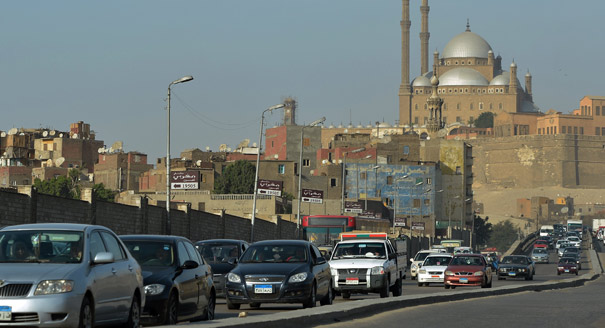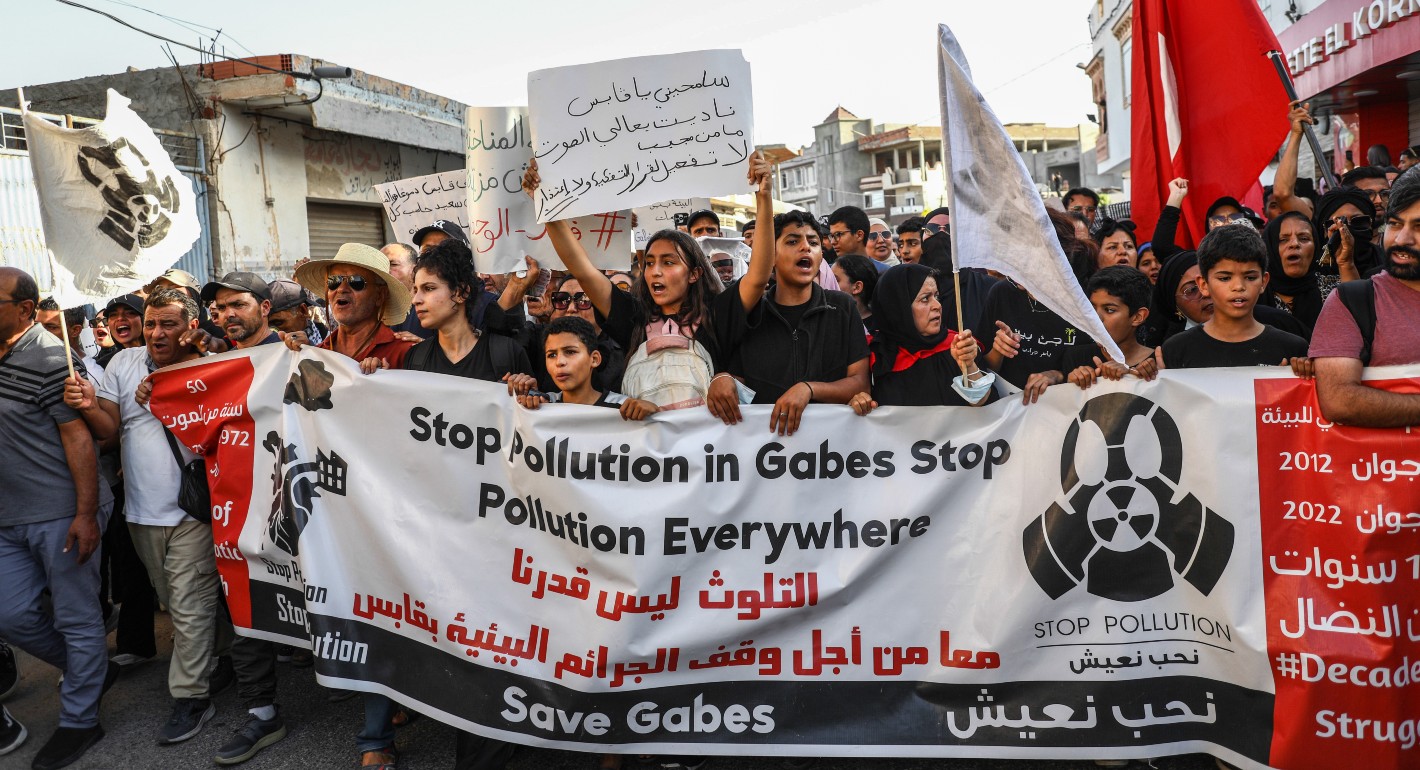Amr Adly, Hamza Meddeb

Source: Getty
The Sisi Government’s Attempts to Win Over Egypt’s Civil Servants
The setting of a minimum and maximum wage for Egypt’s civil service will help the system become more transparent and equal. But comprehensive reform is still needed.
The Egyptian civil service is not only an administrative body in charge of implementing public policies but also a broad social platform with significant weight in dealings with the state. It is capable of having a serious impact on the legitimacy of the ruling regime, and its political influence is so great that successive regimes have sought to gain its allegiance or at least avoid antagonizing it.
The current regime of President Abdel Fattah el-Sisi and the government that preceded it are no exceptions. Indeed, those governments set minimum and maximum wages in part, the regime argued, to address the demands for social justice raised during the 2011 revolution that led to strongman Hosni Mubarak’s overthrow. Through these reforms, the new regime has aligned itself with the demands of the lower and middle ranks of the civil service and has adopted a reformist administrative discourse.
Yet, Egypt still has a long way to go. These measures are important steps and will help the Egyptian system become more transparent and equal. But the adoption of a minimum and a maximum wage has been restricted to civil servants, excluding others in the Egyptian labor market, including those working for state-owned enterprises. These measures are also based on a top-down approach that denies civil servants proper representation, since they remain, by law, deprived of the right to unionize. All in all, these steps cannot be considered as a substitute for a comprehensive reform plan aimed at raising the efficiency of the Egyptian civil service.Long-Needed Reforms
There are various deep-rooted problems troubling Egypt’s civil service. Yet, the country’s public administrative structures have remained essentially unchanged since the era of Hosni Mubarak, even though the civil service has grown significantly.
The regime of Gamal Abdel Nasser used major expansions in public employment to produce a middle class that relied on the state for its livelihood and on which the state, in turn, depended for political support. From 1954 to 1970, as the state began to play a direct role in the production and distribution of goods and services, there was a substantial expansion of public employment. Then, employment in the civil service and state-owned companies was considered a socioeconomic right for university graduates.
Since the 1970s, the Egyptian economy has gradually shifted toward the free market, but the state has remained the largest employer. While recruitment of employees for work in state-owned companies slowed at the end of the 1970s, employment in the civil service expanded from 1970 to 1981 during the rule of Anwar Sadat. It continued to expand under Mubarak, whose regime argued that expansion of state employment was needed to face the growing unemployment rates of the 1980s and 1990s. Mubarak took these steps despite estimates that underemployment had exceeded 70 percent.
The result of this bloating of the ranks was a degenerating civil service. Efficiency deteriorated and employees did not perform to their potential. At the official level, the Mubarak regime froze the basic wage and no change was made to the law (number 47 of 1987) that determines the monthly wages of civil servants in absolute nominal terms.
Still, successive regimes in Egypt, including Mubarak’s, sought to avoid enacting measures that would upset this broad class of civil servants and public sector employees, in part because of lessons learned in the past. In January 1977, Sadat had raised the prices of some commodities in response to the terms of a loan agreement with the International Monetary Fund. The sudden increase in prices of basic goods led to violent bread riots in most Egyptian cities that were unprecedented in the modern history of the country. Public sector workers and civil servants spearheaded the protests by launching a series of strikes and demonstrations, and it is held that they played a significant role in opposing Sadat’s measures. Eventually, Sadat was forced to rescind his decisions and reinstate subsidies while firing his minister of finance.
The civil servants were compensated for their extremely low basic wages with an increase in other compensation, known administratively as variable pay. This consisted of approximately ten forms of allowances, bonuses, raises, and incentives meant to boost the total wage of civil servants without any bearing on basic wages used to calculate pensions. The hope was that this would help mitigate inflationary pressures on public wages and preserve social stability. Yet, this unofficial management of the issue led to the inflation of variable pay to such levels that it constituted, in some cases, more than 90 percent of the total remuneration received by civil servants at the end of each month.1
The freeze on basic wages and the overreliance on variable pay meant that wages were unevenly allocated to the various state ministries. In many instances, civil servants in ministries deemed crucial for the operations of the state and the continuity of the ruling regime, such as the interior, petroleum, electricity, and defense ministries, were paid salaries that far exceeded their counterparts in “poorer” ministries, though by law all these ministries belonged to the same professional category. Moreover, there were severe disparities in the distribution of resources within a given ministry on the basis of personal allegiances and clientelistic divides.
Mubarak had avoided meddling with the official structures governing civil service salaries for many reasons, including a desire to spare the treasury the burden of increasing wages for state employees. But his noninterference policy was more centrally based on his unwillingness to address the unequal distribution of resources within the civil service that resulted from the freezing of the basic wage.
This approach did little to ensure stability, and the Mubarak regime failed to mobilize the support of civil servants or at least guarantee their neutrality. By the end of Mubarak’s rule, increasing numbers of civil servants had joined socioeconomic protests. Since 2004 in particular, corruption has been rampant and frequent protests have occurred across the country. Civil servants have taken part in strikes, sit-ins, and demonstrations, including the protest of the property tax department in 2008 that resulted in the creation of Egypt’s first independent labor union. Some estimates indicate that civil servants held more than one-third of the total labor protests in 2007–2008.
Demands for a minimum wage were an important part of the discourse on social justice voiced by the democratic left and the labor movement in Egypt prior to the January 2011 revolution. In 2009 and 2010, the Egyptian Center for Economic and Social Rights, in cooperation with the independent union movement, won an important verdict on this issue. The Supreme Administrative Court ruled that the government had to set a minimum wage and form a supreme council for wages. The minimum wage demanded was 1,200 EGP (about $168), based on calculations of the basic needs of Egyptian middle-class households. However, the decision excluded civil servants on the basis that they are subject to a special law and not the unified labor law involved in the ruling, which applies to employees in state-owned companies and the private sector only.
Three years later, attention shifted exclusively toward civil servants.
Changes After the January Revolution
After Mubarak was overthrown in January 2011, successive regimes sought to rebuild bridges with state institutions, be they civilian or military. They endeavored to win the loyalty of both the military and the police in particular, especially with the growing security burden placed on them in the aftermath of the revolution when political, social, and security unrest swept through the country.
The transitional military government that took power after Mubarak along with the Muslim Brotherhood–dominated government that followed it issued a series of decisions and laws raising salaries and wages. These decisions had targeted specific public institutions and agencies and were, quite noticeably, in favor of the military and police. However, during all this time, there was no comprehensive restructuring of wages in the Egyptian civil service like the one that occurred after the ouster of Muslim Brotherhood–backed Mohamed Morsi’s government in July 2013.
The military council that took over the transitional administration of the country between February 2011 and July 2012 had issued a decree (number 242 of 2011) that fixed the maximum wage at thirty-five times the minimum wage. But that decree did not enter into force because the subsequent governments failed to set a minimum wage. The decision remained unimplemented until the government of the then interim prime minister, Hazem el-Beblawi, set the minimum wage in January 2014. The interim prime minister, in decision number 22, set the minimum wage of civil servants at 1,200 EGP per month, effective as of January 2014. That decision was the first measure of its kind to enter into force since Mubarak’s era.
Then, at the beginning of the fiscal year in July 2014, President Abdel Fattah el-Sisi capped the maximum monthly wage of civil servants in decree law number 63 at 42,000 EGP (approximately $5,870). This was the first measure of its kind to enter into force since Mubarak’s rule.
The Political Significance of the Civil Service
These measures were not exclusively a matter of administrative reform. They were also not pure austerity measures aimed at simply reducing public expenses. They were an integral part of the new regime’s efforts to gain legitimacy and win the allegiance of its civil service not as a mere administrative body in charge of implementing state policies but rather as a social support platform gathering more than half the employees in the Egyptian economy.
The civil service represents a broad and powerful potential source of support for leaders in Egypt. According to Egypt’s 2007 census, the state employed around 6 million citizens in various public institutions, not including the police and the army. These employees represented around 48 percent of wage earners in Egypt, of whom 43 percent were civil servants working in the civil service and 5 percent were public sector employees working in state-owned companies.
These large numbers of people and the percentage of the labor force they represent explain the social and political importance of this category. Civil servants have become a broad social class endowed with a special relationship with the state, its employer. Even though civil servants seldom act as a single bloc, winning their acquiescence has long proven crucial for social and political stability. Moreover, keeping them happy makes it more likely that they will cooperate with or at least refrain from resisting government policies and decisions that they are supposed to be implementing.
The regime that took power after the fall of the Morsi government in the summer of 2013 sought to raise wages in part to gain the support of this group. The setting of a minimum wage was translated into an increase in the monthly salaries of civil servants at the lower and middle ranks. The leaders also meant to convey a certain image of the new political regime, which was seeking to gain political legitimacy by redefining its relationship with the civil service.
Since the fall of Mubarak’s regime, the civil service in Egypt has faced an internal conflict between lower- and middle-ranked civil servants on the one hand and better-paid high-ranking ones on the other. The conflict is fueled by a lack of transparency, unfairness in the distribution of resources, extreme wage inequalities, and low salaries for a large section of public employees. That conflict had been put on hold during the Mubarak era and not addressed after the January revolution.
The Sisi government decided to take a clear stance on the conflict over inequality within the state apparatus by setting unified minimum and maximum wages. This implied the adoption of more transparency and uniformity in the allocation of resources in the civil service. The minimum wage also helped the new regime to validate its claims, among its social support platform, of endeavoring for reform and social justice.
But setting civil servants’ maximum wage was met with major resistance among higher-income groups in state-owned sectors, such as energy and public banks, as well as among top officers in several ministries, including the Ministry of Interior. Some of these institutions have even declared that they would refrain from implementing the wage cap for fear of losing qualified staff to the private sector. However, the increasing resistance failed to influence the government, which refused to allow any exception to the application of the maximum wage outside of those already included in the law.2
Problems With the Approach
The transitional military government and the Sisi government portrayed the wage decisions as a response to a key demand voiced by the January revolution and by the pre-revolution protest movement.
Yet, while the civil service is large, civil servants do not represent the entirety of wage earners in the country. That means measures that only affect civil servants’ monthly and annual wages will not tackle the more general wage problems that face the labor force in the public, private, and informal sectors.
Moreover, when the government of Hazem el-Beblawi set a minimum wage, it limited its decision to civil servants working in the central and local administrations and excluded employees working in state-owned companies or in economic and service agencies. This generated a wave of labor strikes in March 2014 staged by workers in vital areas, such as the post office and public transportation, who were left out of the new laws.
In addition, the two governments in power after Morsi’s ouster opted for a top-down approach in setting the minimum wage within the civil service and did not appropriately consult with the various stakeholders including the civil servants themselves. Setting the minimum and maximum wages is a critical issue that impacts the living standards of civil servants and that involves fiscal, social, and political considerations. It should not be dealt with as a mere administrative or technical issue. Like many other cases in the world, setting minimum wages often entails negotiations between representatives of labor and those of employers, which would be the state in the case of civil servants. In Egypt, civil servants are still legally denied the right to unionize, and deprived of any legal means to negotiate with the state as their employer.
This ultimately makes the adoption of the minimum wage just a variation on the July or Labor Day bonus that was long used by the political power in Egypt to raise the wages of public employees to secure their political loyalty. The move has even been officially dubbed “the minimum wage premium.”
Conclusion
The administrative and financial measures adopted after Morsi’s overthrow are in part a means for the new regime to gain legitimacy among civil servants by displaying a clear stance in favor of state employees. Though these measures are positive in nature, as they allow for more transparency in the allocation of resources and subject virtually all civil servants the same financial and administrative standards, they are not a comprehensive plan to reform the civil service, or the state of Egypt’s labor force as a whole.
The civil service still suffers from a severe lack of efficiency, widespread corruption in various forms, and abuses of power. And it is not held accountable by any authority, including the parliament and the people. Deeper reform requires a long-term and concerted effort as well as the cultivation of a political and social foundation for the reform process.
Notes
1 For more details, see Abdul Khalek Farook, The Roots of Administrative Corruption (Cairo: Dar Al Shuruk, 2008).
2 The law previews an exception for the diplomatic, consular and commerce corps and for other civil servants representing Egypt abroad. It also excludes other instituions of special nature to be determined by a decree issued by the prime minister.
About the Author

Former Nonresident Scholar, Middle East Center
Adly was a nonresident scholar at the Carnegie Middle East Center, where his research centers on political economy, development studies, and economic sociology of the Middle East, with a focus on Egypt.
- Why Painful Economic Reforms Are Less Risky in Tunisia Than EgyptArticle
Recent Work
Carnegie does not take institutional positions on public policy issues; the views represented herein are those of the author(s) and do not necessarily reflect the views of Carnegie, its staff, or its trustees.
More Work from Carnegie Endowment for International Peace
- Beijing Doesn’t Think Like Washington—and the Iran Conflict Shows WhyCommentary
Arguing that Chinese policy is hung on alliances—with imputations of obligation—misses the point.
Evan A. Feigenbaum
- A China Financial Markets PostCommentary
Description of the post.
Michael Pettis
- The Kremlin Is Destroying Its Own System of Coerced VotingCommentary
The use of technology to mobilize Russians to vote—a system tied to the relative material well-being of the electorate, its high dependence on the state, and a far-reaching system of digital control—is breaking down.
Andrey Pertsev
- Civil Society Restrictions in North Africa: The Impact on Climate-Focused Civil Society OrganizationsArticle
For climate-focused civil society in countries like Morocco, Algeria, and Tunisia to be most effective, organizations should work together to develop networks that extend their reach beyond their local area and connect across borders to share best practices and amplify each other’s work.
Sarah Yerkes
- When Football Is More Than FootballCommentary
The recent African Cup of Nations tournament in Morocco touched on issues that largely transcended the sport.
Issam Kayssi, Yasmine Zarhloule











